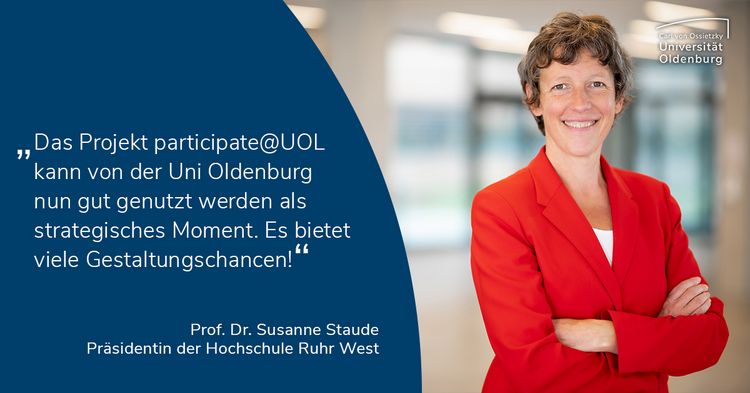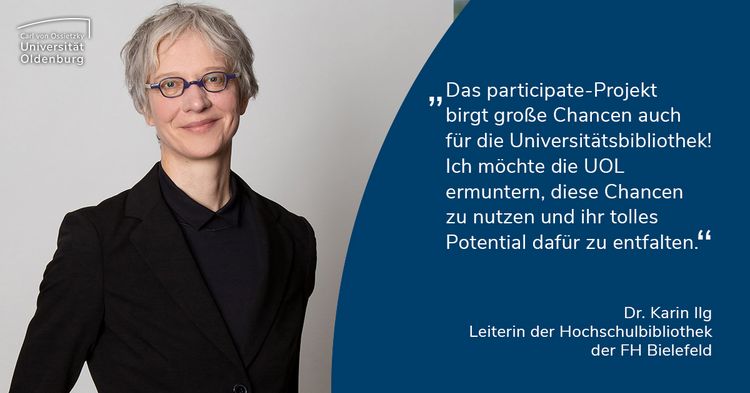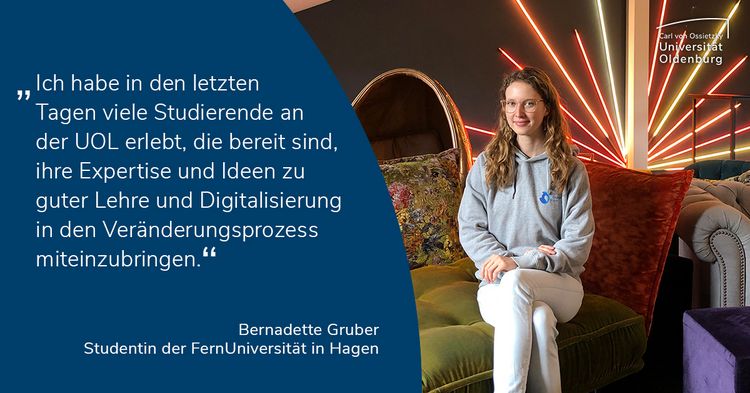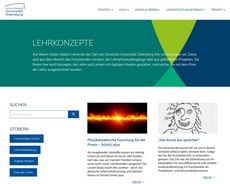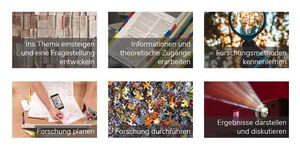Mai 2022
University of Oldenburg Faculty Newsletter
Mai 2022
University of Oldenburg Faculty Newsletter
Jump to
Interview with Professor Dr. Karsten Speck, Vice President for Instruction and International AffairsThree questions for Annalena Karweik, forschen@studiumStrategic consulting on digital transformation of teaching and learning organised by the Hochschulforum Digitalisierug Teaching and Learning in Higher Education and e-Didactics forschen@studium Studying and teaching quality management The Internal Surveys team Project News Events and dates (internal)
Interview with Professor Dr. Karsten Speck, Vice President for Instruction and International Affairs

Which issues would you like to address during your term in office?
As Vice President for Instruction and International Affairs, I have a broad portfolio. As far as academic affairs are concerned, the current priority as we start the summer semester is developing viable strategies that will enable the university to manage the ongoing coronavirus situation as part of the return to normal operations. This is closely connected to promoting the digital transformation of teaching by using pedagogical methods in collaboration with the projects, professorships and schools at our university where instruction is first and foremost in-person. I also want to ensure a smooth transition to institutional accreditation (Systemakkreditierung) and, in doing so, to ensure the autonomy of the University of Oldenburg through the professional recognition of its degree programmes. I also want to do something about the general conditions for studying and teaching for both students and faculty. This encompasses, for instance, the standardisation of examination regulations, academic guidance and psychosocial counselling for students, but also paying greater attention to work-related stress and promoting attractive career paths for faculty and instructors.
Regarding internationalisation, I want to reactivate our international partnerships and exchange programmes and expand our strategic partnerships with the University of Groningen in the Netherlands and the Nelson Mandela University in South Africa. We also need to look at mobility in the wake of Brexit. To achieve these goals, I will be working closely with various offices at the university, such as the International Office and the Internationalisation working group, as well as the internationalisation officers at the schools. As we continue to develop our internationalisation strategy, topics such as diversity, inclusion, digitalisation and sustainability become increasingly important.
How did you find your first few months as Vice President for Instruction and International Affairs?
Although I only started on 1 January 2022, it feels as though I've been here much longer. I see it as my job to be a contact person for students and instructors. So I am open to critical and constructive dialogues with student representatives, such as the Student Council (AStA) and the student associations, as well as with representatives of teaching staff, such as the Deans of Studies and the Staff Council. The first few months, however, were largely dominated by factors and events beyond our control – studying and teaching with coronavirus measures still in place and wrapping up the winter semesters with a high number of coronavirus infections, immediately followed by a whole host of decisions that needed to be made about the summer semester. The transition to institutional accreditation and the university accrediting its own degree programmes is a crucial task for all those involved, including myself, because this is how we can guarantee the quality of our degree programmes for the future. And, of course, over the past few weeks we have also been following discussions regarding the breach of international law with the Russian government’s war in Ukraine and the effect in might have on our university and academic life.
Research-based learning is one of the cornerstones of the mission statement for teaching. Why is research-based learning so important at our university?
Research-based learning has certainly become a hallmark of study programmes and teaching at the University of Oldenburg over the past few years. It is an integral component of the mission statement and many degree programmes as well modules. Supervised by specialists in the field, students have the chance to experience and go through the entire research process from start to finish largely on their own; from identifying a topic and formulating a research question, to choosing the research design and data collection instruments, to conducting a study and interpreting the data. The University of Oldenburg is a pioneer in this respect in Germany, especially with regard to disseminating student research by promoting participation in conferences or publishing articles in forsch!, the online student journal. But at the same time, we have to make sure that students are able to experience research-based learning as part of an larger research process and that there is ample room for creativity, so that students do not become overwhelmed with research projects and group work.
Which societal issues do you think have or will have an impact on studying and teaching at the University of Oldenburg?
Universities constantly have to adapt to the demands and changes in their surrounding environment – such as the labour market, society, demographic changes, migration – but also in respect to their internal structures – such as the diversity of students and instructors. Only in this way can institutions of higher education make sure to remain attractive places to study and work. In this regard, I think that studying and teaching at the University of Oldenburg – with the exception of the coronavirus pandemic – is and will continue to be influenced, at least for the next few years, by the issues already I already addressed in the answers above. However, other issues, such as diversity and inclusion, increasing flexibility of degree programmes, digital transformation of teaching, international opportunities for students, faculty and instructors, as well as ongoing efforts to improve practical relevance and employability also deserve a mention here. As do issues such as the University of Oldenburg being an attractive place to work for researchers and instructors in terms of workload and freedom, being accessible and open to new groups such as non-traditional students and offering continued academic education for professionals. Like other universities, we will have to make considerable efforts in the areas of studying and teaching in order to maintain our student numbers and retain our researchers and teaching staff. We can't take that for granted.
Are you planning to introduce major reforms to studying and teaching during your appointment?
I am somewhat cautious about introducing changes during my two-year term as Vice President since degree programmes offered by the schools are well-established and faculty and instructors enjoy a great deal of freedom in designing their teaching. However, we will have to tackle these trends together if we want to continue to be an attractive university for students, academics and teaching staff. I have set myself the task of raising awareness about the need to modernise degree programmes in good time, to establish closer links between outstanding research and degree programmes, to raise the profile and improve the recognition of teaching and to show greater appreciation for the hard-working schools, degree programmes and teaching staff.
Annalena Karweik, forschen@studium, coordinator of the research-based learning programme
Strategic consulting organised by the Hochschulforum Digitalisierung
Between 30 March and 1 April, the peer-to-peer strategy consultation on digital transformation of teaching and learning took place at the University of Oldenburg as a combination of online and face-to-face meetings. As part of this programme, run by the Hochschulforum Digitalisierung (Forum for Digitalization in Higher Education, abbreviated: HFD), university leadership has the chance to receive advice from experts from other universities who have been previously responsible for or supervised similar processes.
The peers advising the University of Oldenburg were:
The peer-to-peer consultation revolved around two issues. The exchange between the Presidential Board and the peers focused on the one hand on the development of the digital strategy for teaching and its priorities. The other subject of extensive discussions and consultations was the development of the Learning Lab and the Teaching Lab as part of the participate@UOL project. Project staff as well as Deans of Studies and study coordinators from the schools participated in the discussions about the Teaching Lab. As part of the consultation process regarding the Learning Lab – whose design in terms of both space and content is spearheaded by the Library and Information System (BIS) –, the peers met with the library management, the management of the Academic Department for Study Affairs and students.
The consultation days kicked off with discussions among the peer advisors, teachers and students, as well as with the Internal Surveys team of the Academic Department for Study Affairs. Discussions about digital teaching were influenced by the experiences of the past two years of teaching online.
Further information about the peer-to-peer strategy consultation (only in German).
Making (online) teaching accessible
Creating accessible teaching and learning environments is not only advisable but also legally required in order to ensure that all students have equal learning opportunities. The Teaching and Learning in Higher Education team provides practical tips on how to make (online) teaching accessible. And remember: Regardless of different types of disability or chronic illnesses, everyone profits from accessible teaching! Accessible teaching also advances the UOL's commitment to being an open university.
Almost 50! The course design collection is expanding!
Instructors can find inspiration for their course design in the UOL's course design collection. The collection contains now almost 50 course designs and offers a glimpse into the types of content and methods used by other instructors and their experiences. The collection includes examples of the use of digital media in courses, teacher training methods, as well as course designs that have won the Award for Excellence in Teaching.
New offerings in the Teaching and Learning in Higher Education programme: Agile methods, varied questions and building respectful relationships
A variety of offerings organized by the Teaching and Learning in Higher Education team give instructors the opportunity to learn fundamentals, get practical tips and exchange ideas with their colleagues. A series of new courses have recently been added to the programme, including 'Building relationships in (online) teaching', 'Using varied closed questions in your courses and 'Using the agile approach (scrum) in teaching'. For more information about the courses and information on how to sign up, please visit the Teaching and Learning in Higher Education webpages.
Didactic inspiration for research-based learning
When students learn by researching, they investigate a question that they have formulated themselves or in collaboration with other students and go through essential stages of an open-ended research process.
The Teaching and Learning in Higher Education team offers ideas for assisting students in their research-based learning: Didactic inspiration for research-based learning (in German). Following the typical phases of the research cycle, the page "Didactic inspiration" presents different methods and learning activities that can be used for courses employing research-based learning.
This page is currently available only in German, but if you have any questions about research-based learning or would like to discuss your course design, feel free to get in touch with us – we offer consultations in English, too!
Funding for research-based learning in the 2022 summer semester
At the beginning of February, the Research-Based Learning selection committee, headed by Prof. Karsten Speck, Vice President for Instruction and International Affairs, selected projects that will receive funding: 19 research-based learning instructional projects (17 in the 2022 summer semester and two in the 2022/2023 winter semester) and five student research projects on the theme 'New beginning'.
The selected projects will be carried out in the summer semester. The funded student projects will present their research during the Day of Teaching and Learning (24 November 2022).The course designs will be showcased in the university's course design collection at the end of the semester. More information about funding opportunities for students and instructors can be found on the forschen@studium webpage
Deadline for applications for instructional projects for research-based learning in the 2022/2023 winter semester:
5 June 2022
As part of the research-based learning programme, faculty and instructors at the University of Oldenburg can apply for funding for implementing research-based learning formats in their courses. Applications for courses or other activities related to research-based learning (e.g., hiring student assistants, reimbursement of material/equipment or other associated costs) can be submitted by 5 June 2022.
The maximum amount of funding available per project is €3,000. It is also possible to apply for grants (up to a maximum of €1,500) for the follow-up course in the subsequent semester.
The funding announcement and the application form can be found on the forschen@studium webpage
Student research in the spotlight

'Flies, flies, flies! Towards a more sustainable future with the black soldier fly – black soldier fly larvae as a substitute for fish oil and meal in aquaculture.' Lara Disselhoff and Jasmin Behnke, students at the University of Oldenburg, tell us about their research project funded by forschen@studium.
Our project is about cultivating and processing black soldier fly larvae (Hermetia illucens) to produce high-protein feed for aquaculture and thereby to provide an alternative to fish-meal and fish-oil-based feeds. Our primary objective is to find an economic and efficient way of processing this type of flies in order to implement this more sustainable approach in the aquaculture industry.
The flies will be cultivated in the tropical climate of Cairns on the east coast of Australia, since the flies are native to this area. We selected this location because it is an optimal habitat for the fly, but also because it allows us to take on challenges and develop skills that go hand in hand with organising projects. When you plan your own project abroad, you have to think about and plan everything from start to finish, from visa applications and sourcing materials at the location to finding a plot of land for the breeding facility, finding accommodation and so on. This all makes organizing the entire research process much more complicated. So especially in this initial phase, we are brainstorming a lot, because we do not want to get to Cairns and realise that we have forgotten something and, in the worst-case scenario, cannot actually continue with our research. But it is also a great opportunity to learn how manage large projects, to develop solutions to 'problems' (or, rather, challenges) and to achieve our goal of using available resources in a creative way. We like these kinds of challenges because we have the chance to develop our own strategies for solving problems and learn through practice, in which some parts of the projects certainly will succeed while others will not.
It is also exciting to find out if something as small as the larva can help us in making such a huge sustainable change. Quite a lot of research is being done in this area and we are excited to be part of this process; we look forward to sharing our experiences in Australia. Perhaps we will also have the chance to establish groundwork for future collaborations to further advance the use of black soldier fly larvae in aquaculture.
A planning discussion: An element of quality management system for teaching and learning.
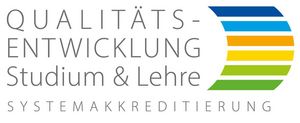
The University of Oldenburg is currently transitioning from the programme accreditation to institutional accreditation (Systemakkreditierung). One of the key elements of this process is the development of a quality management system, which includes the accreditation process for the university's degree programmes. The accreditation process is divided into several stages: provision of documentation, formal review, advisors' preliminary report, consultation, final report, recommendation issued by the accreditation committee and decision by the Presidential Board.
Detailed process descriptions and the exact procedures can be found in the handbook, available in Stud.IP. Information is also available on the Quality management for study and teaching website (currently only in German).
Results of the student and graduate surveys (2021/2022 winter semester) now available
In the 2021/22 winter semester, the Presidential Board carried out a survey among both students and graduates (2019 and 2020 graduation years). The survey asked respondents about their views on the study conditions, about their level of satisfaction with their studies, and many other topics. The results of both surveys are now available on the Internal Surveys website (both only in German):
In addition to the survey report for the university as a whole, also available are results for the individual schools and a categorised overview of responses to open questions. The Presidential Board, the schools and university institutions receive individual reports that are specific to their own needs and circumstances, so that they can use them as a basis for initiating discussions and formulating appropriate measures.
If you have any questions, please feel free to contact the Internal Surveys team at
Save the Date – 24 November 2022: Day of Teaching and Learning and the Presentation of the Award for Excellence in Teaching
On Thursday 24 November 2022, the annual Day of Teaching and Learning and the ceremony for the Award for Excellence in Teaching will take place.
New from the team of Teaching and Learning in Higher Education: Bite-sized pedagogy on research-based learning
In March 2022, we launched a new series, Didaktik-Snacks. One-hour sessions will take place monthly, each with a focus on a different topic related to research-based learning. These sessions offer insight into the challenges and potentials of research-based learning. The idea behind the series is to provide a space for sharing ideas, experiences and advice with colleagues. Instructors who are planning or already teaching courses employing research-based learning can use the sessions to raise and discuss issues they are currently facing.
Bite-sized pedagogy on research-based learning





